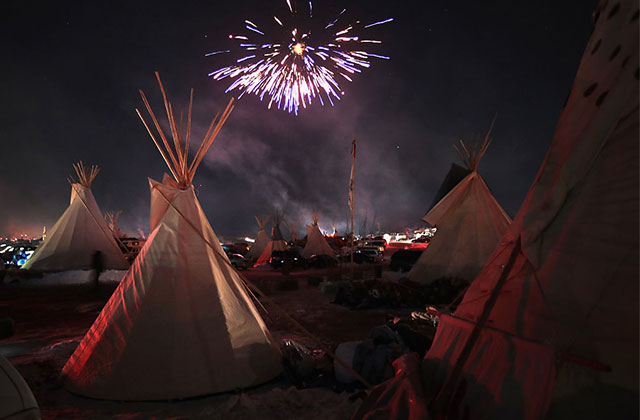In response to Trump’s presidential memorandum pushing the Keystone XL Pipeline forward, Indigenous environmentalists are planning to set up camps along the route—just as they did with the Dakota Access Pipeline.
In a press release sent to Colorlines yesterday (January 30), the Indigenous Environmental Network laid out the movement’s next steps to challenge the administration’s decisions: organizing new camps to oppose the Keystone XL and reviving camps at Standing Rock, North Dakota, against Dakota Access. Organizers aren’t clear where exactly on Keystone’s 1,179-mile long route these camps will appear.
“Donald Trump has declared war on Indigenous nations across the country. [The Keystone XL] pipeline runs right through the traditional lands of the great Sioux Nation,” said Joye Bruan, an organizer from the Cheyenne River Sioux, in the release. “Attacks on our lands, sovereignty and health must stop. We will fight using prayer and nonviolent direct action to stop Keystone XL and Dakota Access pipelines, and we will not back down.”
The statement goes on to note the historical trauma these actions are reigniting among Indigenous communities: “President Donald Trump has renewed extreme historical trauma for our people—once again undermining our safety and our sovereignty. Trump’s lack of clarity and consultation with our Indigenous nations on Keystone XL or the Dakota Access Pipeline is gravely concerning,” said Faith Spotted Eagle of the Ihanktonwan Treaty Council.
The erection of Indigenous-led camps to oppose fossil fuel development is gaining momentum across the country. In Texas, at least two camps are up and running. The Two Rivers Camp near Marfa, Texas is challenging the Trans-Pecos Pipeline, a 148-mile long line that will transport 1.4 billion cubic feet of natural gas a day into Mexico—another project by Dakota Access’ Energy Transfer Partners.
About 50 miles north, Camp Toyahvale water protectors are hoping to stop fracking development by Apache Corp, which has said it wants to drill as many as 3,000 wells over the next 20 years in the surrounding area, according to the Houston Chronicle.
